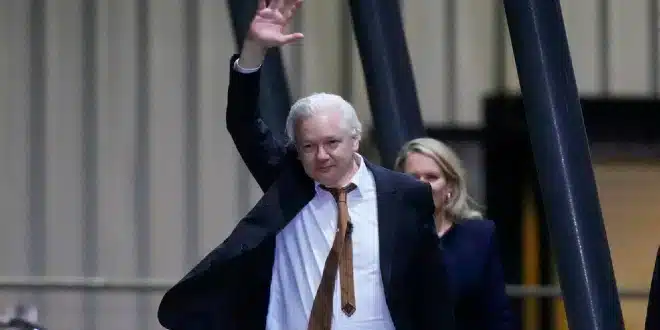### Assange Returns to Australia After Plea Deal
Julian Assange, WikiLeaks founder, returned to Australia on Wednesday after a plea deal with U.S. prosecutors regarding the publication of U.S. military secrets. Assange pled guilty in a U.S. district court in Saipan to charges of obtaining and publishing classified information, ending a prolonged legal saga. He avoided entering the continental U.S. and instead returned via the Northern Mariana Islands, closer to Australia.
Assange was accused of releasing sensitive documents revealing U.S. military misconduct in Iraq and Afghanistan. His actions garnered significant support from press freedom advocates. The materials released by WikiLeaks included a 2007 video of an Apache helicopter attack in Baghdad that killed 11 people, including two Reuters journalists.
On arrival in Canberra, Assange was greeted by his wife, Stella, and his father, John Shipton. Australian officials, including Prime Minister Anthony Albanese, lauded his return. Australian diplomats played crucial roles in negotiating his freedom.
Assange’s plea involved admitting to a felony without serving additional prison time in the U.S., with the five years he spent in a British prison counting towards his sentence. This agreement allows both the U.S. government and Assange to claim a degree of victory.
Assange and his legal team, including lawyer Jennifer Robinson, expressed gratitude for the Australian government’s efforts. Assange’s father, John Shipton, expressed hopes that Assange would enjoy the “great beauty of ordinary life” back in Australia.
Although Assange is back in Australia, his future activities remain uncertain. His lawyer Barry Pollack indicated that Assange would likely continue advocating for free speech and transparency.
The plea deal allows Assange to avoid the more severe penalties he faced under the Espionage Act, which had raised significant concerns among press freedom advocates.
Throughout the legal battle, Assange argued that the Espionage Act contradicted the First Amendment. Prosecutors, however, contended that his actions endangered lives by exposing confidential sources. Despite these allegations, the agreement reached concludes a case fraught with complex legal and ethical questions.
Assange’s return marks the end of a decade-long ordeal that saw him seeking asylum in the Ecuadorian Embassy in London and later imprisoned in the U.K. His release has been met with mixed reactions, balancing between relief from supporters and ongoing criticism from detractors concerned about national security.


